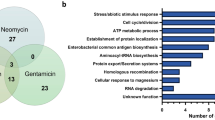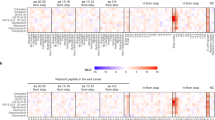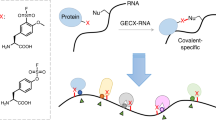Abstract
Rett Syndrome (RTT) is caused in more than 60% of cases by nonsense mutations in the MECP2 gene. So far, no curative therapy for RTT has become available. In other genetic disorders, it has been shown that aminoglycosides can cause a read-through of nonsense mutations with an efficiency of up to 20%. The aim of this study was to evaluate if this therapeutic concept is applicable to RTT. HeLa cells were transfected with eukaryotic expression vectors carrying mutant alleles of frequently occurring MECP2 nonsense mutations that were N-terminally fused to a FLAG tag. Transfected cells were incubated 24 h in the presence of gentamicin. The expression of full-length protein was analyzed by Western blotting and immunofluorescent cell staining. In the presence of gentamicin a read-through varying between 10 and 21.8% was found, depending on the nucleotide sequence context of the nonsense mutations. The full-length protein was located correctly in the nucleus. We have shown that aminoglycoside-mediated read-through of nonsense mutations in the MECP2 gene can be achieved in vitro with efficiency comparable with that seen in other disorders.
Similar content being viewed by others
Log in or create a free account to read this content
Gain free access to this article, as well as selected content from this journal and more on nature.com
or
Abbreviations
- MeCP2:
-
methyl-CpG binding protein 2
- RTT:
-
Rett syndrome
References
Hagberg B, Aicardi J, Dias K, Ramos O 1983 A progressive syndrome of autism, dementia, ataxia, and loss of purposeful hand use in girls: Rett's syndrome: report of 35 cases. Ann Neurol 14: 471–479
Huppke P, Held M, Laccone F, Hanefeld F 2003 The spectrum of phenotypes in females with Rett Syndrome. Brain Dev 25: 346–351
Amir RE, Van den Veyver IB, Wan M, Tran CQ, Francke U, Zoghbi HY 1999 Rett syndrome is caused by mutations in X-linked MECP2, encoding methyl-CpG-binding protein 2. Nat Genet 23: 185–188
Armstrong DD 2005 Neuropathology of Rett syndrome. J Child Neurol 20: 747–753
Guy J, Gan J, Selfridge J, Cobb S, Bird A 2007 Reversal of neurological defects in a mouse model of Rett syndrome. Science 315: 1143–1147
Van Esch H, Bauters M, Ignatius J, Jansen M, Raynaud M, Hollanders K, Lugtenberg D, Bienvenu T, Jensen LR, Gecz J, Moraine C, Marynen P, Fryns JP, Froyen G 2005 Duplication of the MECP2 region is a frequent cause of severe mental retardation and progressive neurological symptoms in males. Am J Hum Genet 77: 442–453
Collins AL, Levenson JM, Vilaythong AP, Richman R, Armstrong DL, Noebels JL, David Sweatt J, Zoghbi HY 2004 Mild overexpression of MeCP2 causes a progressive neurological disorder in mice. Hum Mol Genet 13: 2679–2689
Laccone F, Huppke P, Hanefeld F, Meins M 2001 Mutation spectrum in patients with Rett syndrome in the German population: evidence of hot spot regions. Hum Mutat 17: 183–190
Kellermayer R 2006 Translational readthrough induction of pathogenic nonsense mutations. Eur J Med Genet 49: 445–450
Lukacs GL, Durie PR 2003 Pharmacologic approaches to correcting the basic defect in cystic fibrosis. N Engl J Med 349: 1401–1404
Howard M, Frizzell RA, Bedwell DM 1996 Aminoglycoside antibiotics restore CFTR function by overcoming premature stop mutations. Nat Med 2: 467–469
Wilschanski M, Yahav Y, Yaacov Y, Blau H, Bentur L, Rivlin J, Aviram M, Bdolah-Abram T, Bebok Z, Shushi L, Kerem B, Kerem E 2003 Gentamicin-induced correction of CFTR function in patients with cystic fibrosis and CFTR stop mutations. N Engl J Med 349: 1433–1441
Wagner KR, Hamed S, Hadley DW, Gropman AL, Burstein AH, Escolar DM, Hoffman EP, Fischbeck KH 2001 Gentamicin treatment of Duchenne and Becker muscular dystrophy due to nonsense mutations. Ann Neurol 49: 706–711
Keeling KM, Bedwell DM 2002 Clinically relevant aminoglycosides can suppress disease-associated premature stop mutations in the IDUA and P53 cDNAs in a mammalian translation system. J Mol Med 80: 367–376
Jones PL, Veenstra GJ, Wade PA, Vermaak D, Kass SU, Landsberger N, Strouboulis J, Wolffe AP 1998 Methylated DNA and MeCP2 recruit histone deacetylase to repress transcription. Nat Genet 19: 187–191
Howard MT, Shirts BH, Petros LM, Flanigan KM, Gesteland RF, Atkins JF 2000 Sequence specificity of aminoglycoside-induced stop condon readthrough: potential implications for treatment of Duchenne muscular dystrophy. Ann Neurol 48: 164–169
Welch EM, Barton ER, Zhuo J, Tomizawa Y, Friesen WJ, Trifillis P, Paushkin S, Patel M, Trotta CR, Hwang S, Wilde RG, Karp G, Takasugi J, Chen G, Jones S, Ren H, Moon YC, Corson D, Turpoff AA, Campbell JA, Conn MM, Khan A, Almstead NG, Hedrick J, Mollin A, Risher N, Weetall M, Yeh S, Branstrom AA, Colacino JM, Babiak J, Ju WD, Hirawat S, Northcutt VJ, Miller LL, Spatrick P, He F, Kawana M, Feng H, Jacobson A, Peltz SW, Sweeney HL 2007 PTC124 targets genetic disorders caused by nonsense mutations. Nature 447: 87–91
Author information
Authors and Affiliations
Corresponding author
Additional information
Supported by The German Research Foundation (HU 941/2-1), Kennedyallee 40, 53175 Bonn, Germany. DFG Research Center for Molecular Physiology of the Brain (CMPB/EXC171), Humboldtallee 23, D-37073 Göttingen. E-rare EuroRett network/BMBF, Hannoversche Strasse 28, 10115 Berlin.
Rights and permissions
About this article
Cite this article
Brendel, C., Klahold, E., Gärtner, J. et al. Suppression of Nonsense Mutations in Rett Syndrome by Aminoglycoside Antibiotics. Pediatr Res 65, 520–523 (2009). https://doi.org/10.1203/PDR.0b013e31819d9ebc
Received:
Accepted:
Issue date:
DOI: https://doi.org/10.1203/PDR.0b013e31819d9ebc
This article is cited by
-
Drug Studies on Rett Syndrome: From Bench to Bedside
Journal of Autism and Developmental Disorders (2020)
-
Rescue of Methyl-CpG Binding Protein 2 Dysfunction-induced Defects in Newborn Neurons by Pentobarbital
Neurotherapeutics (2015)
-
Rett Syndrome and MeCP2
NeuroMolecular Medicine (2014)
-
Readthrough of nonsense mutations in Rett syndrome: evaluation of novel aminoglycosides and generation of a new mouse model
Journal of Molecular Medicine (2011)
-
The genetic basis of non-syndromic intellectual disability: a review
Journal of Neurodevelopmental Disorders (2010)



